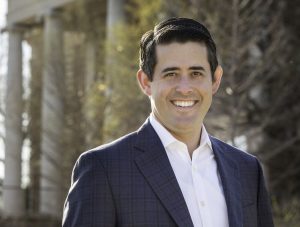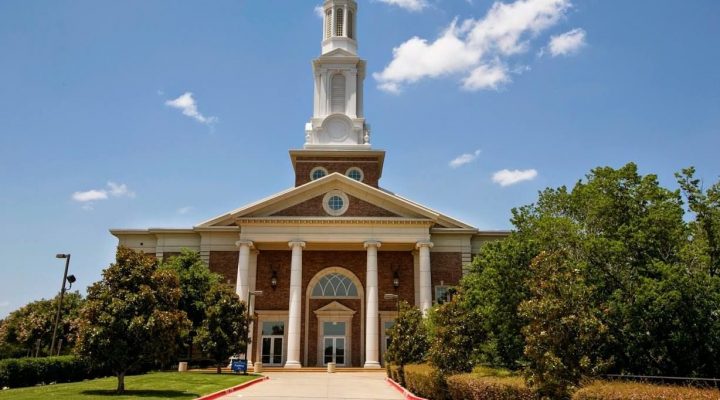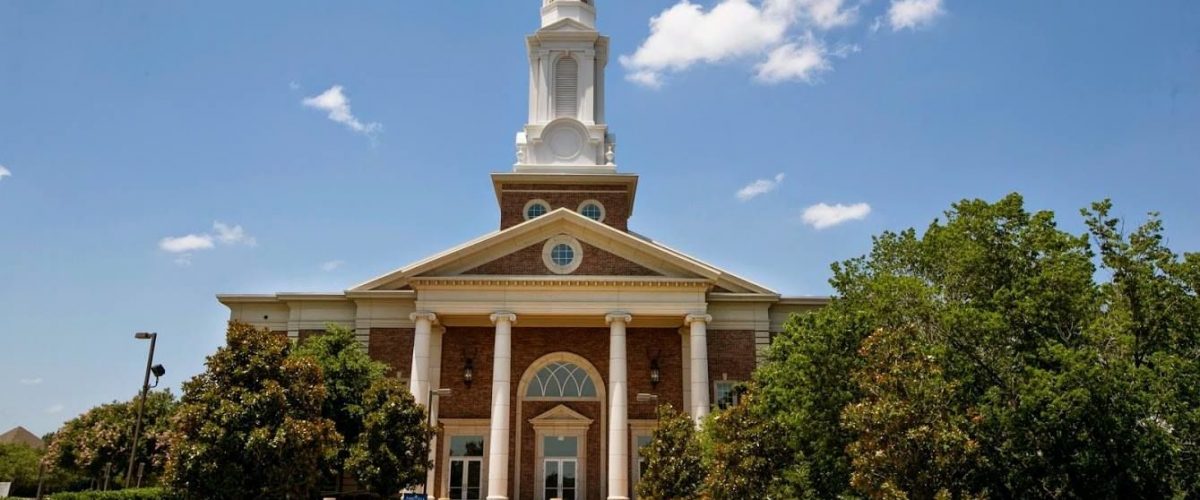One of the largest United Methodist congregations in Texas, which said it would circumvent the denomination’s process on leaving, has relented and allowed its members to vote on the exit. It also has agreed to pay the required departure fees to retain its property.
Almost 900 members of the 6,500-member St. Andrew United Methodist Church in Plano voted Feb. 21 by a 98 percent margin to leave the worldwide United Methodist Church, the North Texas Annual Conference announced.
The denomination is in the process of dividing, largely over congregations’ positions on LGBTQ issues. Departing congregations generally are more conservative than churches that choose to remain.

Arthur Jones at St. Andrew United Methodist Church
St. Andrew will comply with the UMC’s rule requiring exiting congregations to pay their regional units two years’ financial contributions, called apportionments, along with its portion of two years’ clergy pensions.
The provision, known as Paragraph 2553, also requires a two-thirds supermajority approval vote by church members “present and voting.” That’s how less than 900 members made the decision on St. Andrew’s future for all 6,500 members.
Pastor Arthur Jones and St. Andrew’s executive committee Chair Kathy King shocked UMC leaders Sept. 29, 2022, by announcing the church in suburban Dallas would leave the UMC. Furthermore, they said, St. Andrew would retain its property without following the process laid down by the 2019 General Conference, the denomination’s international legislative assembly.
Almost 900 members of the 6,500-member St. Andrew United Methodist Church in Plano voted Feb. 21 by a 98 percent margin to leave the worldwide United Methodist Church.
At that time, Jones and King said the church’s leaders determined its property was not subject to the United Methodist Church’s trust clause, which stipulates all local churches’ property is held “in trust” for the regional units that typically fund their establishment. How they determined St. Andrew’s legal position regarding its property has not been detailed by church leaders.
With rare exceptions, courts have upheld the trust clause in lawsuits brought by churches seeking to leave the denomination without paying for their property.
Taken by surprise
The September 2022 announcement took United Methodist leaders, including then-Bishop Michael McKee, by surprise. The resulting firestorm of criticism against St. Andrew grew to such a point that McKee issued a letter instructing North Texas clergy and members to stop talking about the St. Andrew situation because confidential discussions were under way.
The North Texas Conference’s Feb. 22 statement said: “Since October, St. Andrew’s members have engaged in discernment work, including a Feb. 15 informational session with the church’s pastors and a representative from the North Texas Conference. Last night, St. Andrew’s members concluded this discernment period, gathering to vote on the issue of disaffiliation per the (Book of Discipline). The vote passed with 98.6% of those in attendance voting to disaffiliate — 859 for, 12 opposed.”
The statement predicted the North Texas Conference’s board of trustees would “confirm St. Andrew’s inclusion in the list of disaffiliating churches for annual conference approval at the March 4 special called session.”
Departure may cost millions
St. Andrew’s departure fees may be kept confidential. Given the congregation’s membership size and the value of its property in upscale Plano, its exit fees can be expected to total hundreds of thousands of dollars, if not millions.
Another departing congregation roughly St. Andrew’s size, Mount Bethel in Marietta, Ga., paid the North Georgia Annual Conference $13 million to leave with its property after the conference filed a lawsuit.
Until it’s formally severed at a March 4 special session, St. Andrew is the second-largest church in the North Texas Conference and the seventh-largest United Methodist congregation in the state.
Until it’s formally severed at a March 4 special session, St. Andrew is the second-largest church in the North Texas Conference and the seventh-largest United Methodist congregation in the state.
Won’t join Global Methodists
St. Andrew’s leaders have said the congregation will not join the breakaway Global Methodist Church, started in May 2022 by dissident “traditionalists,” despite its pastor’s familial ties to proponents of the new denomination.
Arthur Jones’ father, Scott J. Jones, became a Global Methodist Church bishop less than two weeks after his retirement from the UMC in January.
His open advocacy for disaffiliation in the Houston-based Texas Annual Conference where he was the episcopal leader drew such criticism that a resolution to have him investigated for violating church law was adopted in November by the South Central Jurisdictional Conference. However, Jones retired before an inquiry could begin.
This month, the House of Wesleyan Studies at Baylor University’s George W. Truett Theological Seminary announced Scott Jones was joining its faculty. Jones was a professor of evangelism at UMC-related Southern Methodist University’s Perkins School of Theology in Dallas when he was elected a United Methodist bishop.
Since 2019, 1,800 local churches out of 30,000 U.S. United Methodist congregations have exited the denomination. United Methodists churches are found throughout sub-Saharan Africa and in Europe and the Philippines.
Cynthia B. Astle is a veteran journalist who has covered the worldwide United Methodist Church at all levels for more than 30 years. She serves as editor of United Methodist Insight, an online journal she founded in 2011.
Related articles:
Why breaking up is so hard to do for United Methodists: Connectionalism
Amid the breakup, United Methodists are still serving their communities
In stunning development, United Methodist African bishops repudiate separatist group


